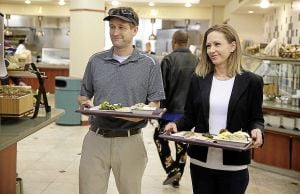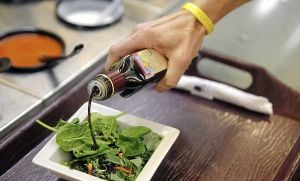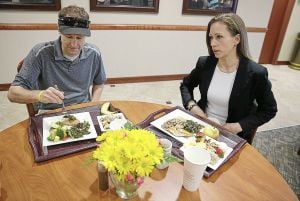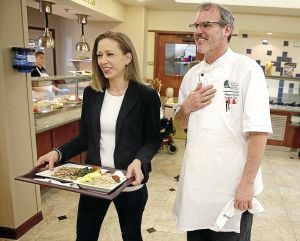Posted: Tuesday, April 8, 2014 12:00 am
|
Updated: 7:53 am, Tue Apr 8, 2014.
Before his cancer diagnosis seven years ago, Todd Gillett didn't know what Swiss chard was.
Now, he eats it nearly every day.
Now, he eats it nearly every day.
"His motto was if it's green, I don't touch it," said his wife, Jeanne Gillett.
He protested that he was
never that bad. He avoided fast food and didn't eat that poorly before
he was diagnosed with synovial cell sarcoma, but he has radically
changed his diet for the better in hopes of keeping the cancer from
returning. About one to three in a million people are diagnosed with the
rare soft-tissue tumor each year.
A report earlier this
year by the World Health Organization suggested that diet and lifestyle
changes could dramatically reduce a predicted rise in cancer rates.
Dr. Simeon Jaggernauth, a
medical oncologist at Cancer Treatment Centers of America, where
Gillett sought treatment, said people being treated for cancer need to
eat well because their bodies need good building blocks for repair after
radiation, chemotherapy or surgery.
That means controlling sugar intake, avoiding junk food and limiting alcohol, he said.
"There is a lot of common sense to it," he said.
There is no one food that
everyone should eat. So-called super foods can have high levels of
antioxidants but can't be relied on alone, Jaggernauth said.
"It's not the only thing in my diet that's important," he said. "Having a balanced diet is best."
Exercise is also vital,
and everyone should find a physical activity like walking, running,
biking or swimming, Jaggernauth said.
The same advice is
generally recommended to people looking to prevent cancer. In addition
to using online resources, people interested in prevention should talk
to their doctors about the best diet and exercise for them.
"Those are probably your most important resources," he said.
The Gillett family follows a mostly paleo diet, eschewing grains and sugar and eating only organic, nonprocessed foods.
Todd Gillett's teenage children have adapted well to the diet changes and are happy with their meals, he said.
Todd and Jeanne Gillett
drink water, tea and red wine and eat mostly vegetables, fruits and
nuts, but it's not as restrictive as it sounds, Jeanne Gillett said.
There are a lot of foods out there that some people don't even know about, she said.
"You don't starve, and you're not wanting," she said.
Sweets and other
off-limits foods aren't as tempting anymore because they know they will
feel bad physically if they break their diet, which has given them more
energy and boosted their immune systems, the Gilletts said.
Neither spends time at
the gym, per se, but they are active people. He golfs frequently, and
both spend a lot of time walking, they said.
Nearly every day, Todd
Gillett walks across the street from the insurance agency he owns and
eats lunch at the Cancer Treatment Centers of America cafeteria.
He chose to be treated at the facility partly because of such options.
"They make it more accessible and easy to be healthy," he said.
The center also gives patients access to a dietitian and naturopath as part of every treatment team.
Kenny Wagoner, the
executive chef at Cancer Treatment Centers of America, said he spends a
lot of time talking to diners to find out what they would like to eat,
but all of his recipes are approved by a dietitian.
"We do everything we can to make sure our patients get a healthy, balanced, nutritious diet," he said.
Jeanne Gillett said the
family's diet isn't that difficult to follow, especially when unhealthy
foods are dropped on a varied schedule and not all at once.
"It's not as hard as you think," she said.






No comments:
Post a Comment